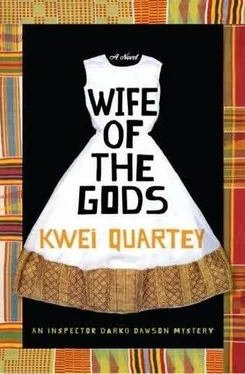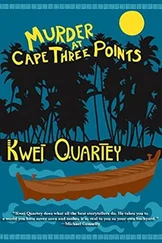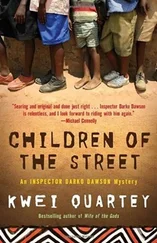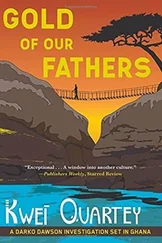After another seven months, collective prayers were apparently answered in the affirmative. Osewa had given birth to a baby boy they had named Alifoe. She invited Mama up for the celebrations. Mama hesitated at first, worried about leaving Cairo, but Papa urged her to go. Cairo had been doing well at the time. Papa would stay home with him and Darko. It would only be for two or three days.
So Mama left for Ketanu and stayed for five days with Auntie Osewa, Uncle Kweku, and Alifoe, who was a beautiful and healthy baby. When Mama returned home to Accra, she told stories of how every family member loved to hold and cuddle him.
Mama must have enjoyed her visit tremendously, because three months later she went back to Ketanu. Six days passed, eight, and then ten. Mama didn’t return. Darko and Cairo began to fret.
“When is Mama coming home?”
“Soon,” Papa replied, which was meaningless.
After another two days, however, Papa was as worried as his two sons were. Like most people in Ketanu, Auntie Osewa and Uncle Kweku did not have a phone, and so Papa had no choice but to take a trip up. He asked one of his two sisters to stay with the boys while he was gone.
When he got to Ketanu, Auntie Osewa and Uncle Kweku warmly welcomed him but wondered why he hadn’t come with Beatrice.
“What?” Papa said. “Beatrice is not here with you?”
Auntie Osewa and Uncle Kweku were dumbstruck. “She was here for only four days,” they said. Osewa told Papa she had accompanied Beatrice to the tro-tro stop to say good-bye to her when she was leaving.
“Did she tell you for certain that she was headed for Accra?” Papa asked.
“But of course,” Auntie Osewa said. “Where else would she be going?”
They stood staring at each other in astonishment. Somewhere between Ketanu and Accra, Mama had disappeared.
A NUM BINEY, CHIEF PHYSICIANat the Volta River Authority Hospital, could perform any operation, from an appendectomy to a facial reconstruction. He had to. The hospital served the entire population within a hundred-mile radius. Dr. Biney had the help of residents from the medical schools in Accra and Kumasi, but in truth he was on call twenty-four hours a day, seven days a week, 365 days a year.
And over the years he had become known for his skill at autopsies, much of it self-taught. With only about twelve pathologists available for the entire country, most of them at Korle-Bu, it was only natural Dr. Biney had become a much-sought-after postmortem guru. That would explain why he had a constant backlog of autopsy cases. He had added on an extra Wednesday evening to try to catch up.
The single-story cream-and-mahogany buildings of the hospital were nestled among trees, green lawns, and clipped hedges. Its sections-the male and female surgical wards, the children’s ward, and so on-were connected by long open verandas. This was no scruffy place fallen on hard times. Taking good care of it was revenue from the Akosombo hydroelectric dam on the Volta River, just a few kilometers away.
Dr. Biney crossed the expanse of tended grass in front of the morgue, the only building at the hospital not connected to the rest. Perhaps logically so: the wards were for the living, the morgue for the dead. Biney was weary, having been up practically the whole night with various calls, including one for a victim of a vehicle crash. He wore exhaustion like his clothes-he was aware of it, but he didn’t focus on it.
The morning was working up to the sweltering day it would become, and already the air was close on the skin like a cloak. Dr. Biney walked past the standby generators that ensured there would never be a failure of refrigeration in the morgue should there be a power cut. True, the Akosombo Dam was near, but blackouts did occur.
He unlocked the rear door and entered the mercifully air-conditioned morgue, first through the anteroom, where the bodies were washed, and then to the autopsy room itself. There were two postmortem tables. On busy days, every day really, Biney would finish one case and go almost immediately to the second table for the next.
He looked around for a moment, thinking he really must get the missing tiles on the wall replaced and get rid of that old defunct table in the corner that they needed to cart away somewhere.
He went looking for Obodai, the attendant, and found him scrubbing down the stone floor in front of the gleaming bank of aluminum storage drawers. There were twenty of them in columns of four. They were at full capacity and unable to keep up with the number of bodies arriving weekly. It was time to add some more drawers.
“Morning, Obodai.”
Obodai stopped his work and practically stood at attention.
“Good morning, sir.” He gave an imperceptible bow, a gesture so slight one might fail to spot it, but it was there-a show of eternal deference to his boss. Obodai had been working at the morgue for ages. He was wizened and wiry, loyal and unflappable. Whether you needed his assistance at five in the morning or eleven at night, he would be there. He was always the first to arrive and the last to leave.
“We’ll be doing the case of the young woman from Volta Region,” Dr. Biney said. “First priority.”
“Very good, sir. When do you wish to start, sir?” “We’re waiting for a detective from Accra. He’ll be witnessing. Should be here soon.”
“Very good, sir. Everything will be ready.”
Approaching Akosombo, Dawson slowed down at the security gate, but the guards waved him on. They had an instinct about who was legitimate and who was not.
Just a little way past the gate was the Volta River Authority Hospital. Dawson parked and went in through an open-walled reception area. About fifteen patients, some with children, were waiting to be called in for treatment. As Dawson paused, wondering where Dr. Biney’s office was, a young woman with a brilliant smile and expensively braided hair approached him.
“Good morning, sir,” he said. “Are you Detective Inspector Dawson?”
“Good morning. Yes, that’s me.”
“Welcome to the VRA Hospital, sir.”
Dawson shook hands with her as she introduced herself as Victoria, Dr. Biney’s administrative assistant.
“He is expecting you,” she said warmly. “Please come this way. Did you have a safe trip up from Accra?”
He followed Victoria through a double door into the skylit, air-conditioned corridor within. Dr. Biney’s office was the third on the left, and his assistant showed Dawson in.
“Dr. Biney, Detective Inspector Dawson has arrived.”
As always in new surroundings, Dawson took a quick snapshot of the room. A full-scale model human skeleton in the far corner, bookshelf bursting with medical texts and journals, stethoscope and ophthalmoscope on the desk, piles of folders and papers everywhere, including on the floor. An outgrown office space of a busy man with too much to do and too little time in which to do it.
Biney rose from his desk. “D.I. Dawson, welcome!”
He was a hearty man with a voice to match, standing at least six two. He was taller than Dawson and heavier by far. He had a neatly cropped head of hair and an amazing salt-and-pepper mustache that sprouted straight out to the sides. When they shook hands, Biney’s palm dwarfed Dawson’s.
“Thank you for coming, Mr. Dawson. I trust the journey was fine?”
“Excellent, thank you, Doctor.”
“Can we get you anything? Some refreshment, maybe?”
“No, thank you. I’m okay for now.”
“Come along, then. Shall we proceed to the morgue?”
They suited up-gown, apron, gloves, face shield, and shoe covers-and moved on into the autopsy room. Dawson had somehow imagined a long row of tables, but there were only two, and upon one of them lay the body of a young woman. Must be Gladys Mensah .
Читать дальше












